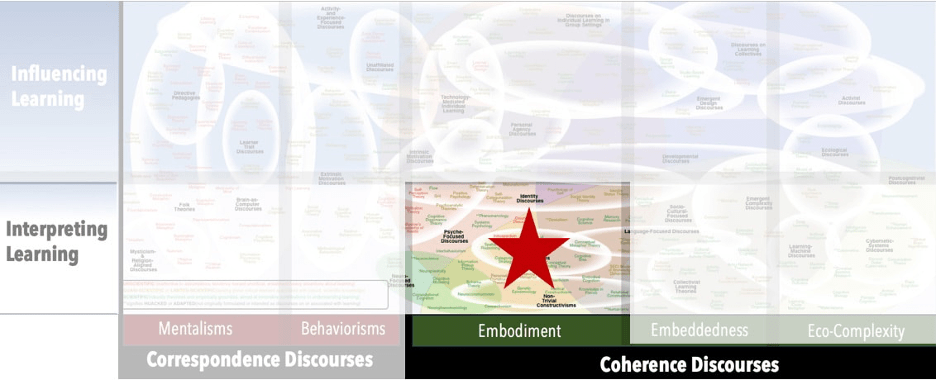AKA
Educational Romanticism
Focus
Preserving the innate goodness of the individualPrincipal Metaphors
- Knowledge is … repertoire of possibility
- Knowing is … authentic action
- Learner is … innately good individual
- Learning is … corrupting
- Teaching is … protecting; nurturing
Originated
Latter 1700sSynopsis
Romanticism is a philosophical and artistic movement that emphasizes individuality and subjective experience. While not intended to inform schooling, a few key texts (in particular, J.-J. Rousseau’s 1762, Emile, Or Treatise on Education) served to translate the core themes of Romanticism into principles of education, such as a faith in innate human goodness, protecting the child from the corrupting influences of collectivity. Subdiscourses include:- Organic Romanticism (usually attributed to Jean-Jacques Rousseau, late-1700s) – a diversely defined element of Rousseau’s Romanticism, associated with one or all of the following principles: (1) a rapport with nature that defies and surpasses modern and wester rationalist and objectivist impulses; (2) the assumption of innate goodness and purity of the child; (3) the conviction that the “Natural” is inherently better than human-made.
Commentary
More often than not, when heard in the context of formal education, references to Romanticism are used to mock or criticize notions that oversimplify complex phenomena. Indeed, the word “romantic” is frequently used as a synonym for “non-scientific.” For example, some popular notions that have been described as romantic include those extreme versions of Mindset that reject the notion of intellectual limits and particular Activist Discourses that ground arguments in imagined utopias. Very few of these uses are appropriate to the actual tenets of Romanticism, but they no doubt reflect implicit criticism of the discourse’s anticipation of (and likely contribution to) the learner-focused, libertarian emphases of many prominent 20th-century movements. (See., e.g., Alternative Education, and compare Progressivism.) That said, however, the foundational principles of the discourse, as framed within education, do not stand up to scrutiny.Authors and/or Prominent Influences
Jean-Jacques RousseauStatus as a Theory of Learning
Romanticism is perhaps better described as a belief about the learner than a theory of learning.Status as a Theory of Teaching
As it has been taken up in education, Romanticism is principally a discourse on teaching that is founded on an assumption about human nature.Status as a Scientific Theory
Romanticism meets none of our criteria of a scientific discourse … which may help to explain why it is sometimes used as a synonym for “unscientific.”Subdiscourses:
- Organic Romanticism
Map Location

Please cite this article as:
Davis, B., & Francis, K. (2023). “Romanticism” in Discourses on Learning in Education. https://learningdiscourses.com.
⇦ Back to Map
⇦ Back to List
